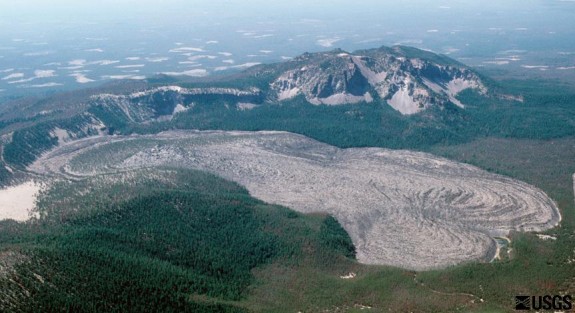Two Companies Want to Frack the Slopes of a Volcano
Two companies want to hydraulically fracture the Newberry Volcano in Oregon

The Newberry caldera. Photo: USGS
The Newberry Volcano, sitting a few dozen miles from the mid-sized town of Bend, Oregon, is a four-thousand-foot high shield volcano that “has as many as 400 volcanic vents scattered across its slopes.” To the eyes of two energy companies, AltaRock Energy Inc. and Newberry Geothermal, this volcano is the perfect testing ground for a new project that would see the tools of hydraulic fracturing—fracking—turned on an idle volcano.
Fracking is the relatively new (and decidedly controversial) technique that allows drillers to open cracks in rock formations deep underground, often with the aim of extracting natural gas. The plan by the two energy companies to frack the Newberry Volcano was approved by the Bureau of Land Management a few months ago.
Rather than going after natural gas, the pair are pushing for the development of what is called an engineered geothermal system. The project, says Wired UK,
will involve injecting water into a series of cracks in the rocks at a high enough pressure that it reaches three kilometres beneath the surface, fracturing connected veins of rock to access the heat beneath and creating a series of connected geothermal reservoirs in the process. Water will be introduced to these reservoirs, where heat from the rocks will turn it to steam, which then turns turbines at surface-level to generate electricity.
The U.S. Geological Survey says that Newberry has been resting for the past 1,300 years, but that it is “certain to erupt again.” Wired raises the concern that since fracking has been linked to an uptick in small earthquakes in some regions, “it seems odd that a volcano would be a first choice to setup shop.” A recent release by the U.S. Department of the Interior, and a study by the National Research Council, however, found that “there is no evidence to suggest that hydraulic fracturing itself is the cause of the increased rate of earthquake.” Rather, induced earthquakes have been found to be triggered by the inappropriate disposal of waste water used during the fracking process.
If the project pans out, it could see the tools of hydraulic fracturing, currently associated with a glut of potential problems, turned in a decidedly greener direction by harnessing renewable geothermal energy.
More from Smithsonian.com:
There’s a Reason It’s Called Global Warming: European Emissions Rise From Imported American Coal
North Carolina Rep Pushes Wrong Button and Approves Fracking in the State
/https://tf-cmsv2-smithsonianmag-media.s3.amazonaws.com/accounts/headshot/smartnews-colin-schultz-240.jpg)
/https://tf-cmsv2-smithsonianmag-media.s3.amazonaws.com/accounts/headshot/smartnews-colin-schultz-240.jpg)